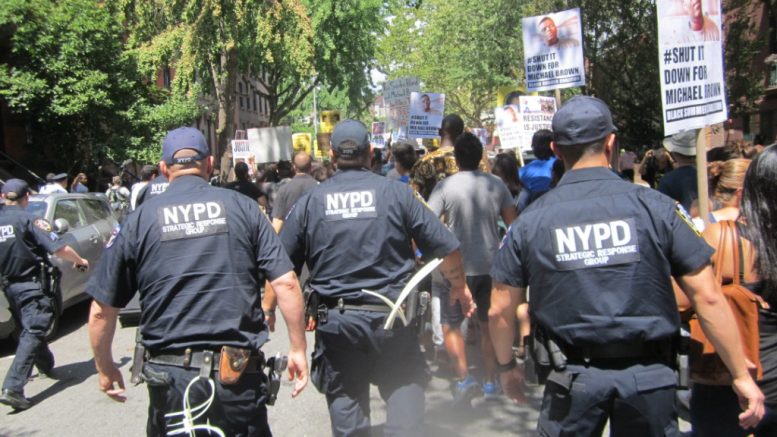Federal Judge Charles S. Haight heard oral comments Tuesday in what was referred to as a “Fairness Hearing.” The hearing, which was open to any New York City resident or organization concerned about NYPD spying, stemmed from two class-action lawsuits, Raza v. City of New York and Handschu v. Special Services Division.
The Raza lawsuit was filed in 2013 as a result of news reporting that exposed extensive NYPD spying against Muslims. At the same time, the plaintiffs in Handschu reopened the decades-old case to modify and strengthen the Handschu Guidelines, which were adopted in 1985 under a consent decree limiting the surveillance and infiltration tactics of the NYPD.
Lawyers for both sides in Raza and Handschu agreed to settlement terms in January, but before ruling on the agreement and the Guidelines modifications, Judge Haight invited residents of New York City to file comments with the court. Originally, Haight required written comments to be filed by April 19, but at Wednesday’s hearing he extended the deadline by 30 days.
The hearing saw a mixture of comments both for and against the settlement terms and proposed modified Guidelines.
With gracious help from the Bill of Rights Defense Committee/Defending Dissent Foundation, I filed written comments and provided an oral statement on Wednesday as a New York City resident, activist, legal worker, member of the National Lawyers Guild, and author of Crashing the Party: Legacies and Lessons from the RNC 2000, which examines the pervasive use of political surveillance and infiltration among other police tactics used today to suppress dissent .
I admitted that I was unqualified to speak on NYPD targeting of Muslims, the subject of the Raza lawsuit, but that I had direct experience with political surveillance and infiltration by police.
I began my oral statement by pointing to the court’s repeated use of the terms, “fair” and “reasonable” as a test for whether the proposed Guidelines modifications were acceptable. Are the modifications fair to the plaintiff class and are they a reasonable solution, asked Judge Haight.
However, I argued that “fair” and “reasonable” are abstract terms and highly subjective. The real test for the proposed modifications is whether they can prevent the type of abuses that brought us all into the courtroom in the first place. I argued that the proposed Guidelines were insufficient to prevent the ongoing abusive and unlawful spying by NYPD.
My statement focused on three main points, though there is much more to say about the inadequacies of the Guidelines modifications.
First, the level of suspicion for opening an investigation is too low. Police need only suspicion of “criminal activity” to open or continue an investigation. Without definition of “criminal activity,” we don’t know if the NYPD can still open an investigation based on infractions like jaywalking or jumping the subway turnstile, or misdemeanors like disorderly conduct and resisting arrest, which political activists are commonly charged with. And what about civil disobedience?
Second, the proposed modifications give undercover police sweeping discretion to infiltrate if “the information sought could not be reasonably obtained in a timely and effective way by a less intrusive means.” I believe the abusive infiltration that many spoke out against at the hearing would not stop with this giant loophole.
Third, much greater civilian oversight than what is offered by the proposed modifications is needed. While a move in the right direction, a single mayor-appointed civilian representative in a committee of twelve high-level police and intelligence officials and their legal counsel is insufficient to the task. Ultimately, we need a fully independent mechanism for civilian review if we want to end further abuse.
I concluded my statement by providing two examples of current day abuses by NYPD that will go unaddressed by the proposed Handschu Guidelines modifications.
Less than a year after the NYPD was forced to shut down its Demographics Unit, which was largely responsible for the abusive spying in the Muslim community, the police department created the Strategic Response Group (SRG). The SRG clumsily combined NYPD efforts on counterterrorism and political protest, and has already been shown to be abusive toward activists. The city has kept secret the details of how the SRG operates, but questionable surveillance practices have been alleged.
Another area of concern was brought to the attention of the public by the New York Civil Liberties Union (NYCLU), class counsel in the pending lawsuits. Only weeks ago, the NYCLU exposed that the NYPD owned and regularly operated Stingray-type devices used to eavesdrop on cell phone conversations by mimicking a cell tower. The NYPD admitted it used Stingray-type devices more than one thousand times between 2008-2015 “without a written policy” and using a “practice of obtaining only lower-level court orders rather than warrants,” according to the NYCLU. The NYCLU Executive Director Donna Lieberman also said in a statement that, “If carrying a cell phone means being exposed to military grade surveillance equipment, then the privacy of nearly all New Yorkers is at risk.” Yet, the proposed Guidelines modifications do not appear to address this concern.
Many at the hearing spoke in favor of an extension of time to allow for more public education and for more New Yorkers to file comments. Several Muslim speakers requested that the comment period be extended past the Holy Month of Ramadan, which ends in early July.
Regardless of whether Judge Haight agrees to further extend the deadline, the comments filed on April 19 with the help of BORDC/DDF will likely be revised before the 30-day extension period is over.
Stay tuned!
Source: bordc.org




